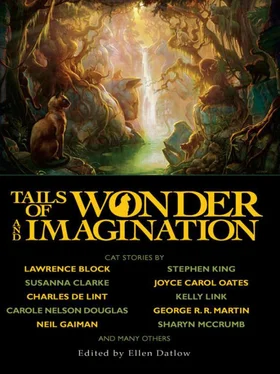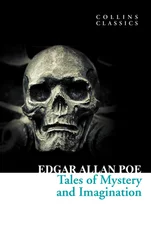Ellen Datlow - Tails of Wonder and Imagination
Здесь есть возможность читать онлайн «Ellen Datlow - Tails of Wonder and Imagination» весь текст электронной книги совершенно бесплатно (целиком полную версию без сокращений). В некоторых случаях можно слушать аудио, скачать через торрент в формате fb2 и присутствует краткое содержание. Год выпуска: 2010, ISBN: 2010, Издательство: Night Shade Books, Жанр: Фэнтези, Фантастика и фэнтези, Ужасы и Мистика, на английском языке. Описание произведения, (предисловие) а так же отзывы посетителей доступны на портале библиотеки ЛибКат.
- Название:Tails of Wonder and Imagination
- Автор:
- Издательство:Night Shade Books
- Жанр:
- Год:2010
- ISBN:978-1-59780-170-6
- Рейтинг книги:5 / 5. Голосов: 1
-
Избранное:Добавить в избранное
- Отзывы:
-
Ваша оценка:
- 100
- 1
- 2
- 3
- 4
- 5
Tails of Wonder and Imagination: краткое содержание, описание и аннотация
Предлагаем к чтению аннотацию, описание, краткое содержание или предисловие (зависит от того, что написал сам автор книги «Tails of Wonder and Imagination»). Если вы не нашли необходимую информацию о книге — напишите в комментариях, мы постараемся отыскать её.
collects the best of the last thirty years of science fiction and fantasy stories about cats from an all-star list of contributors.
Tails of Wonder and Imagination — читать онлайн бесплатно полную книгу (весь текст) целиком
Ниже представлен текст книги, разбитый по страницам. Система сохранения места последней прочитанной страницы, позволяет с удобством читать онлайн бесплатно книгу «Tails of Wonder and Imagination», без необходимости каждый раз заново искать на чём Вы остановились. Поставьте закладку, и сможете в любой момент перейти на страницу, на которой закончили чтение.
Интервал:
Закладка:
“Obviously, this was not the ultimate result of the conflict,” said Haviland Tuf, “or we would not be sitting here talking.” Doubt batted Foolishness soundly across the head, and the smaller kitten fell off Tuf’s knee to the floor. Tuf bent and scooped him up. “Here,” he said, handing him to Kefira Qay, “hold him, if you please. Their small war is distracting me from your larger one.”
“I—why, of course.” The Guardian took the small black-and-white kitten in hand gingerly. He fit snugly into her palm. “What is it?” she asked.
“A cat,” said Tuf. “He will jump out of your hand if you continue to hold him as if he were a diseased fruit. Kindly put him in your lap. I assure you he is harmless.”
Kefira Qay, appearing very uncertain, shook the kitten out of her hand onto her knees. Foolishness yowled, almost tumbling to the floor again before sinking his small claws into the fabric of her uniform. “ Ow,” said Kefira Qay. “It has talons.”
“Claws,” corrected Tuf. “Tiny and harmless.”
“They aren’t poisoned, are they?”
“I think not,” said Tuf. “Stroke him, front to back. It will make him less agitated.”
Kefira Qay touched the kitten’s head uncertainly.
“Please,” said Tuf. “I said stroke, not pat.”
The Guardian began to pet the kitten. Instantly, Foolishness began to purr. She stopped and looked up in horror. “It’s trembling,” she said, “and making a noise.”
“Such a response is considered favorable,” Tuf assured her. “I beg you to continue your ministrations, and your briefing. If you will.”
“Of course,” said Qay. She resumed petting Foolishness, who settled down comfortably on her knee. “If you would go on to the next tape,” she prompted.
Tuf wiped the stricken ship and the dreadnaught off the main screen. Another scene took their place—a winter’s day, windy and chill by the look of it. The water below was dark and choppy, flecked with white foam as the wind pushed against it. A dreadnaught was afloat the unruly sea, its huge white tentacles extended all around it, giving it the look of some vast swollen flower bobbing on the waves. It reached up as they passed overhead, two arms with their writhing snakes lifting feebly from the water, but they were too far above to be in danger. They appeared to be in the gondola of some long silver airship, looking down through a glass-bottomed viewport, and as Tuf watched, the vantage point shifted and he saw that they were part of a convoy of three immense airships, cruising with stately indifference above the war-torn waters.
“The Spirit of Aquarius, the Lyle D., and the Skyshadow,” said Kefira Qay, “on a relief mission to a small island grouping in the north where famine had been raging. They were going to evacuate the survivors and take them back to New Atlantis.” Her voice was grim. “This record was made by a news crew on the Skyshadow, the only airship to survive. Watch.”
On and on the airships sailed, invincible and serene. Then, just ahead of the silver-blue Spirit of Aquarius, there was motion in the water, something stirring beneath that dark green veil. Something big, but not a dreadnaught. It was dark, not pale. The water grew black and blacker in a great swelling patch, then bulged upward. A great ebony dome heaved into view and grew, like an island emerging from the depths, black and leathery and immense, and surrounded by twenty long black tentacles. Larger and higher it swelled, second by second, until it burst from the sea entirely. Its tentacles hung below it, dripping water, as it rose. Then they began to lift and spread. The thing was fully as large as the airship moving toward it. When they met, it was as if two vast leviathans of the sky had come together to mate. The black immensity settled atop the long silver-blue dirigible, its arms curling about in a deadly embrace. They watched the airship’s outer skin tear asunder, and the helium cells rip and crumple. The Spirit of Aquarius twisted and buckled like a living thing, and shriveled in the black embrace of its lover. When it was over, the dark creature dropped the remains into the sea.
Tuf froze the image, staring with solemn regard at the small figures leaping from the doomed gondola.
“Another one got the Lyle D. on the way home,” said Kefira Qay. “The Skyshadow survived to tell the story, but it never returned from its next mission. More than a hundred airships and twelve skimmers were lost in the first week the fire-balloons emerged.”
“Fire-balloons?” queried Haviland Tuf. He stroked Doubt, who was sitting on his console. “I saw no fire.”
“The name was coined the first time we destroyed one of the accursed things. A Guardian skimmer put a round of explosive shot into it, and it went up like a bomb, then sank, burning, into the sea. They are extremely inflammable; one laser burst, and they go up spectacularly.”
“Hydrogen,” said Haviland Tuf.
“Exactly,” the Guardian confirmed. “We’ve never taken one whole, but we’ve puzzled them out from bits and pieces. The creatures can generate an electric current internally. They take on water, and perform a sort of biological electrolysis. The oxygen is vented into the water or the air, and helps push the things around. Air jets, so to speak. The hydrogen fills the balloon sacs and gives them lift. When they want to retreat to the water, they open a flap on top—see, up there—and all the gas escapes, so the fire-balloon drops back into the sea. The outer skin is leathery, very tough. They’re slow, but clever. At times they hide in cloud banks and snatch unwary skimmers flying below. And we soon discovered, to our dismay, that they breed just as fast as the dreadnaughts.”
“Most intriguing,” said Haviland Tuf. “So, I might venture to suggest, with the emergence of these fire-balloons, you lost the sky as well as the sea.”
“More or less,” admitted Kefira Qay. “Our airships were simply too slow to risk. We tried to keep things going by sending them out in convoys, escorted by Guardian skimmers and aircars, but even that failed. The morning of the Fire Dawn… I was there, commanding a nine-gun skimmer… it was terrible…”
“Continue,” said Tuf
“The Fire Dawn,” she muttered bleakly. “We were… we had thirty airships, thirty, a great convoy, protected by a dozen armed skimmers. A long trip, from New Atlantis to the Broken Hand, a major island grouping. Near dawn on the second day, just as the east was turning red, the sea beneath us began to… seethe. Like a pot of soup that has begun to boil. It was them, venting oxygen and water, rising. Thousands of them, Tuf, thousands. The waters churned madly, and they rose, all those vast black shadows coming up at us, as far as the eye could see in all directions. We attacked with lasers, with explosive shells, with everything we had. It was like the sky itself was ablaze. All those things were bulging with hydrogen, and the air was rich and giddy with the oxygen they had vented. The Fire Dawn, we call it. It was terrible. Screaming everywhere, balloons burning, our airships crushed and falling around us, bodies afire. There were dreadnaughts waiting below, too. I saw them snatching swimmers who had fallen from the airships, those pale tentacles coiling around them and yanking them under. Four skimmers escaped from that battle. Four. Every airship was lost, with all hands.”
“A grim tale,” said Tuf.
Kefira Qay had a haunted look in her eyes. She was petting Foolishness with a blind rhythm, her lips pressed tightly together, her eyes fixed on the screen, where the first fire-balloon floated above the tumbling corpse of the Spirit of Aquarius. “Since then,” she said at last, “life has been a continuing nightmare. We have lost our seas. On three-fourths of Namor, hunger and even starvation hold sway. Only New Atlantis still has surplus food, since only there is land-farming practiced extensively. The Guardians have continued to fight. The Sunrazor and our two other spacecraft have been pressed into service—bombing runs, clumping poison, evacuating some of the smaller islands. With aircars and fast skimmers, we have maintained a loose web of contact with the outer islands. And we have radio, of course. But we are barely hanging on. Within the last year, more than twenty islands have fallen silent. We sent patrols out to investigate in a half-dozen of those cases. Those that returned all reported the same things. Bodies everywhere, rotting in the sun. Buildings crushed and ruined. Scrabblers and crawling maggies feasting on the corpses. And on one island they found something else, something even more frightful. The island was Seastar. Almost forty thousand people lived there, and it was a major spaceport as well, before trade was cut off. It was a terrible shock when Seastar suddenly stopped broadcasting. Go to the next exhibit, Tuf. Go on.”
Читать дальшеИнтервал:
Закладка:
Похожие книги на «Tails of Wonder and Imagination»
Представляем Вашему вниманию похожие книги на «Tails of Wonder and Imagination» списком для выбора. Мы отобрали схожую по названию и смыслу литературу в надежде предоставить читателям больше вариантов отыскать новые, интересные, ещё непрочитанные произведения.
Обсуждение, отзывы о книге «Tails of Wonder and Imagination» и просто собственные мнения читателей. Оставьте ваши комментарии, напишите, что Вы думаете о произведении, его смысле или главных героях. Укажите что конкретно понравилось, а что нет, и почему Вы так считаете.












